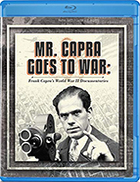Mr. Capra Goes to War: Frank Capra's World War II Documentaries
|  Between 1934 and 1940, Frank Capra directed six films, five of which earned him a nomination for the Best Director Oscar, three of which he won—for It Happened One Night (1934), Mr. Deeds Goes to Town (1937), and You Can’t Take It With You (1939). In addition, three of the films he directed during that period were among the top 30 highest grossing films of the decade, with It Happened One Night topping the box office in 1934 and Mr. Smith Goes to Washington coming in second in 1939 (behind The Wizard of Oz, although both were eventually surpassed by Gone With the Wind). So, to say that Capra was one of the most successful and critically acclaimed filmmakers working in Hollywood at the dawn of World War II would be a decided understatement. Like many of his Hollywood peers, including directors William Wyler, George Stevens, John Huston, and John Ford and producer Walt Disney, Capra left his Hollywood career and worked directly for the U.S. government during the war by producing military orientation and training films. Shortly after the Japanese attack on Pearl Harbor, Capra enlisted in the Army Signal Corps and began working under Army Chief of Staff George C. Marshall. Deeply disturbed by a viewing of Leni Riefenstahl’s Triumph of the Will (1934), which Capra rightly understood as a particularly insidious feat of psychological warfare, he sought to counter such propaganda by producing a series of films that came to be known as the Why We Fight series. The goal was simple: to explain in stark, direct, uncomplicated terms why the United States was fighting in World War II. As he put it in an interview published in Take One in 1975, “We had to convince the soldiers, the young punks. And nobody is tougher to convince than young punks. Everything they see, they smell a sense of ‘Well, they’re trying to sell us a bill of goods.’ This we knew at the very beginning. And we knew what we were up against if we didn’t do a good job. If the soldiers didn’t accept the Why We Fight films, then we were lost.” Thus, between 1942 and 1944, Capra oversaw the production of numerous films for the U.S. military, seven of which comprised the Why We Fight series. That series was required viewing for all Army personnel, and all seven films were also given theatrical releases for the general public. This was something entirely new, as the Army had been commissioning Hollywood studios and their filmmakers to produce training films, but not persuasive lecture films intended to educate new soldiers about the history leading up to the war, who they would be fighting, and why. The entire series was produced for about $400,000, which was then roughly the cost of a single medium-budget Hollywood film. They made brilliant use of existing documentary footage, which was edited together with various dramatizations to give overwhelming issues of worldwide exigency a decidedly personal and human dimension. Capra enlisted a number of significant collaborators, including director William Wyler (who eventually bowed out to pursue other war-time film projects) and screenwriting brothers Julius and Philip Epstein, who stopped work on their script for Casablanca (1942) to answer Capra’s call. He also tried to involve the pioneering documentarian Robert Flaherty, but Flaherty ended up working on Louisiana Story (1948), his document on the lives of rural Cajuns, instead. Olive Films’ new Blu-ray Mr. Capra Goes to War: Frank Capra’s World War II Documentaries compiles five of Capra’s war-time films, including two from the Why we Fight series: Prelude to War (1942), in which he effectively portrayed the world as being divided between free and slave by recounting the historical rise of fascism in contrast to the virtues of democracy, and the two-part The Battle of Russia (1943), which focuses on the Soviet Union’s struggle to fend off the invading German forces. Also on the disc is The Negro Soldier (1944), which uses a fictional dramatic narrative written by black filmmaker Carlton Moss to demonstrate why it was important for African Americans to enlist and fight; Tunisian Victory (1944), which gives a supposed soldier-on-the-ground perspective on the Allied victories in Northern Africa; and, finally, Your Job in Germany (1945), a fascinating training film written by none other than Theodore Geisel (aka Dr. Seuss) for occupying American soldiers in Germany after the war ended. All of these films are intriguing historical documents in their own right, and while they vary in terms of their content and approach, they demonstrate collectively the persuasive rhetorical means by which Capra and his collaborators sold U.S. involvement in the war as an absolute good. In later interviews, Capra freely admitted that these propaganda films necessarily simplified, streamlined, and even outright eliminated elements of history and political reality that did not serve their immediate purpose. These were documents meant to convey in stark black-and-white terms the necessity of U.S. involvement in the war, lest the evils of fascism and despotism reign supreme. Compromises had to be made, including some judicious elisions of various elements of history that didn’t work with the narrative Capra needed to tell. For example, The Battle of Russia goes out of its way to downplay Soviet leader Josef Stalin and the country’s communist system in favor of a focus on the stalwart Russian people, while The Negro Soldier avoids the history of black slavery and the Civil War (which is conspicuously absent given that the film includes a rundown of black Americans’ service in all American wars going back to the Revolution). Thus, these films are hardly unbiased historical documents that played fair with the facts, but are rather carefully constructed arguments meant to ensure that U.S. soldiers were aware of the stakes of their country’s involvement in the most devastating war in human history. As Capra later put it, “We weren’t telling the political history of each country. We were all in a battle fighting this combination of Hitler, Tojo, and Mussolini.”
Copyright © 2018 James Kendrick Thoughts? E-mail James Kendrick All images copyright © Olive Films | ||||||||||||||||||||||||||||||
Overall Rating: 

 (3)
(3)


